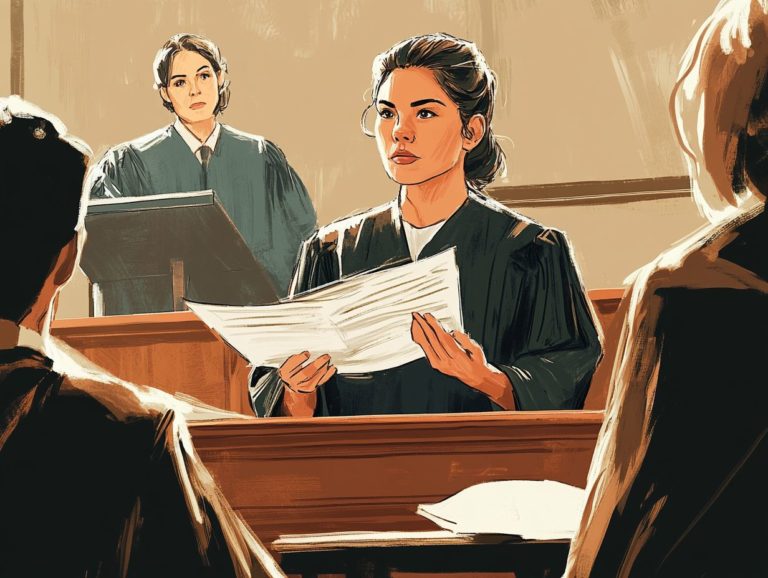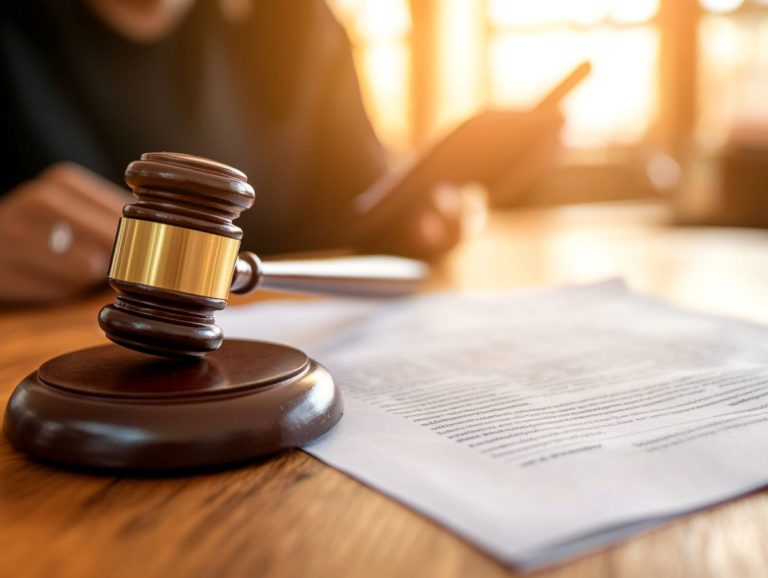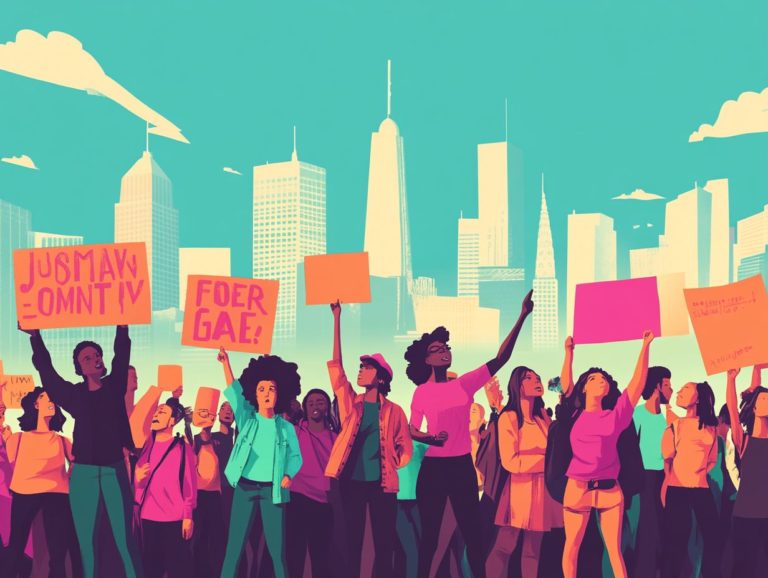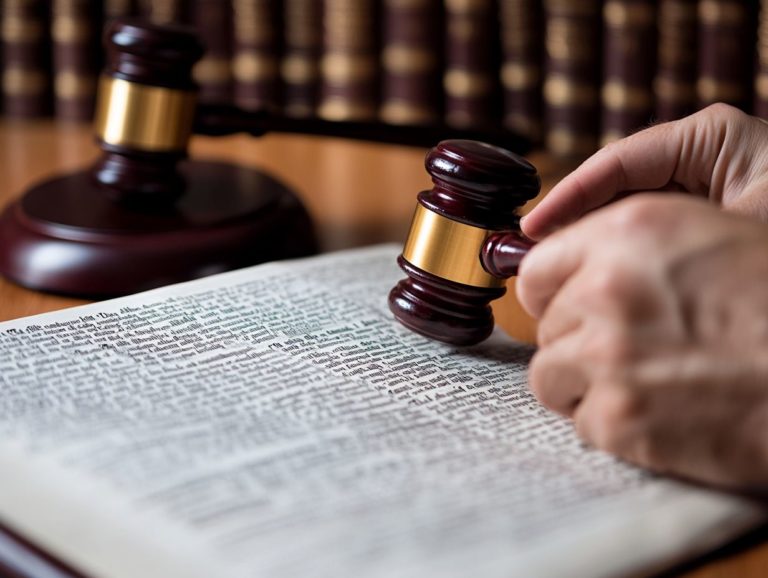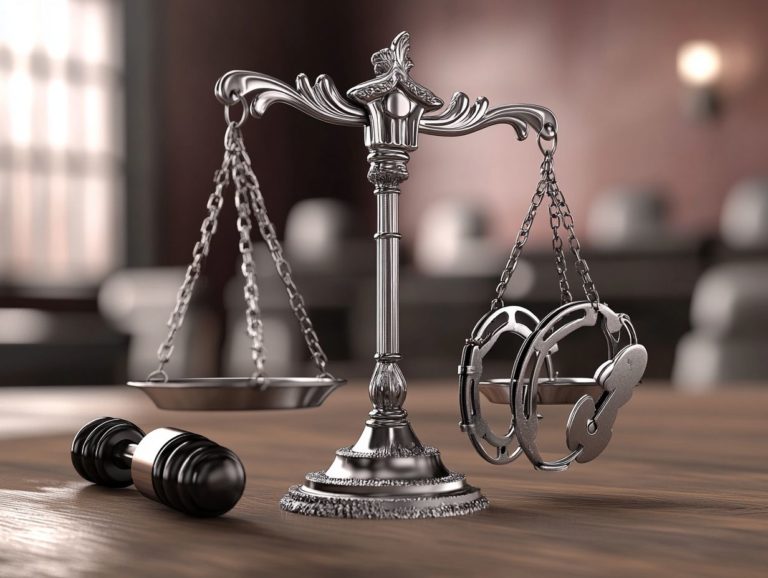Understanding Police Conduct and Your Rights
Police behavior is pivotal in fostering public trust and ensuring safety within the community. Yet instances of misconduct can severely compromise these vital efforts.
Understanding your rights is crucial for protecting yourself. Recognizing common forms of police misconduct like excessive force, false arrests, and discrimination equips you to navigate interactions with law enforcement more effectively.
This guide will clarify what constitutes police misconduct, outline the steps you should take if you experience it, and detail the legal protections available to you.
By staying informed, you empower yourself to ensure that your rights are upheld.
Contents
- Key Takeaways:
- Common Types of Police Misconduct
- What to Do if You Experience Police Misconduct
- Legal Protections Against Police Misconduct
- Frequently Asked Questions
- What is the purpose of understanding police conduct and your rights?
- What are some rights I have when interacting with the police?
- What is considered appropriate police conduct?
- What should I do if I feel my rights have been violated by the police?
- Are there any exceptions to my rights when interacting with the police?
- How can I educate myself on my rights and police conduct?
Key Takeaways:
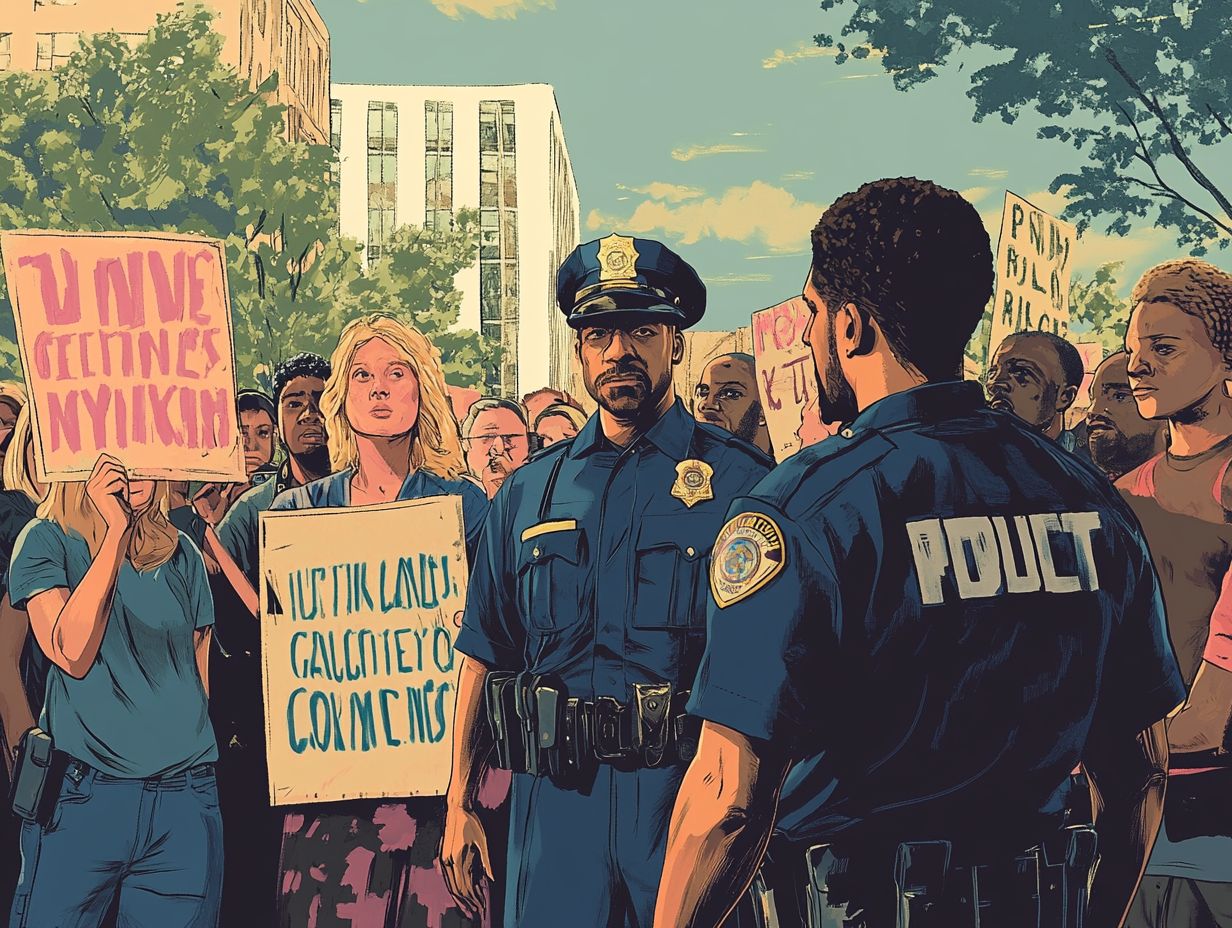
- Know your rights against police misconduct.
- Take action if you encounter misconduct.
- Seek legal help if necessary.
- Stay informed and advocate for your rights.
What is Police Behavior?
Police behavior refers to the actions you observe from law enforcement as they carry out their duties. This encompasses a wide range of activities, including how they interact with the public, enforce laws, and manage various situations, such as traffic stops or arrests.
Evaluating police behavior is critical, not only for maintaining public trust but also for ensuring that law enforcement fulfills their responsibilities within the framework of basic rights. These interactions must honor individuals’ rights to fair treatment and protection against unlawful searches.
Legal standards dictate the behavior of law enforcement, guiding them on the appropriate use of force and ensuring accountability for their actions. When violations occur, they can trigger significant legal repercussions and civil unrest, making it imperative for law enforcement agencies to prioritize training and adherence to constitutional mandates.
Understanding Your Rights
Understanding your rights during police interactions is essential for ensuring your protection and that your basic rights are respected. The Fourth Amendment means police can’t search you without a good reason. Knowing when to exercise your right to remain silent can greatly influence the outcome of any questioning by law enforcement.
In any legal encounter, seeking legal advice is crucial to effectively assert your rights, especially in situations involving arrests, traffic stops, or consent to searches.
You can ask if you are free to leave during a police stop. This simple question can clarify your situation significantly. The Fifth Amendment means you don’t have to say anything that could get you in trouble, underscoring the importance of remaining silent when you re uncertain about the situation.
Having legal counsel can provide invaluable guidance on navigating these encounters, ensuring that your interactions with law enforcement are appropriate and that your rights are safeguarded. Being informed gives you the power and promotes accountability in policing, ultimately enhancing public trust in the legal system.
Common Types of Police Misconduct
Police misconduct can take on many forms, deeply eroding public trust and violating individual rights.
You may encounter instances of police brutality, where excessive force is wielded unnecessarily, or find yourself in a situation of false arrest, where individuals are detained without appropriate legal grounds.
Discrimination in law enforcement practices is another troubling issue, as highlighted by various ACLU reports that expose systemic problems within police departments.
These forms of misconduct not only infringe upon basic rights but also create a lasting cycle of distrust between communities and law enforcement agencies. Know these issues, stand firm, and help build a community where everyone feels safe and respected.
Excessive Force
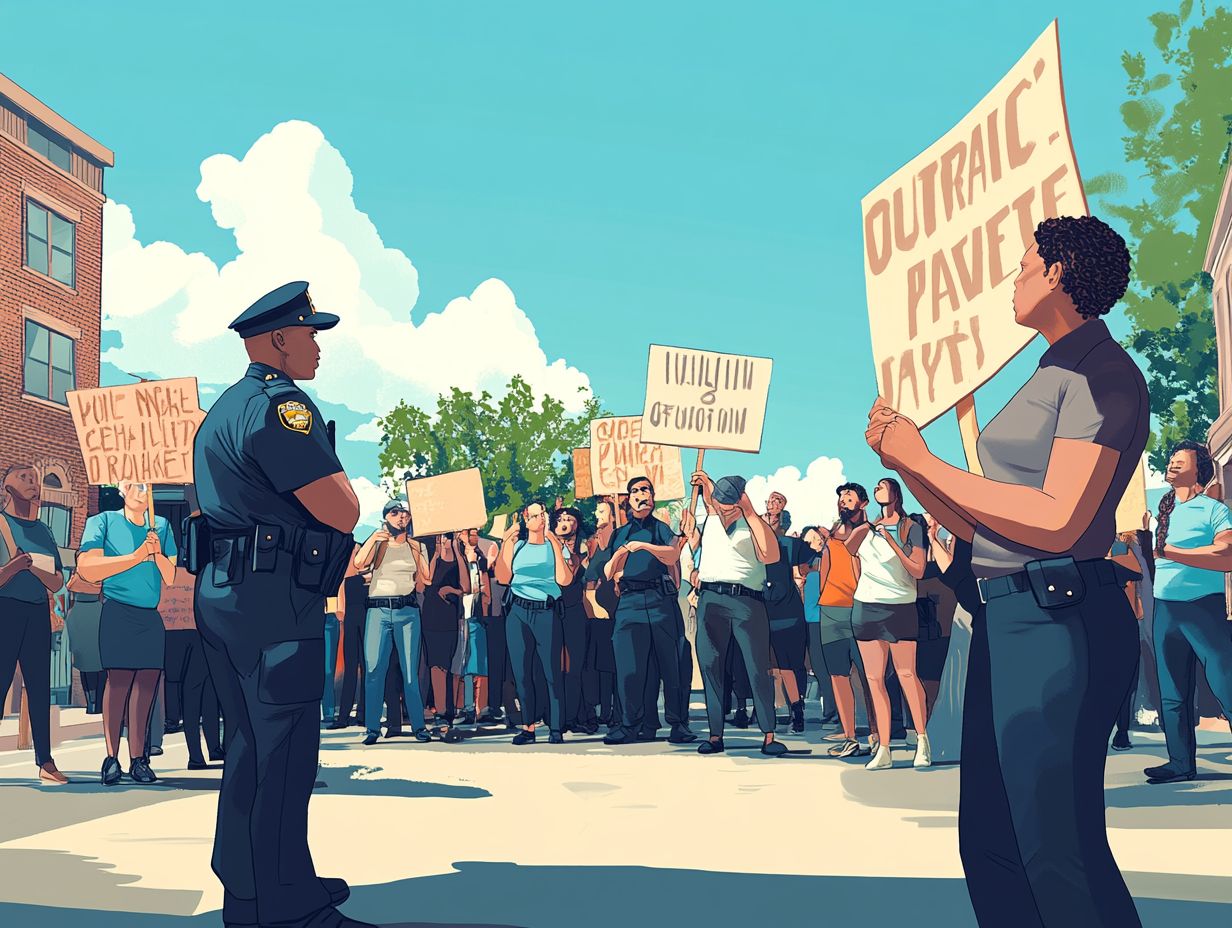
Excessive force in policing occurs when law enforcement officers use more force than necessary to manage a situation. This often leads to severe consequences for the individuals involved, including physical harm or wrongful death. Such instances raise significant civil rights concerns and legal implications.
Reports of police brutality highlight clear examples where officers overstep their authority. These actions often lack legal justification, resulting in civil suits and community outrage.
Excessive force can manifest when officers deploy tasers or firearms in scenarios that do not warrant such measures, like traffic stops or minor disturbances. The legal standards for justifiable force typically require that the level of force used is proportional to the threat posed.
When excessive force is utilized, it undermines public trust and raises alarms about systemic failings within law enforcement. This leads to widespread calls for reform and accountability, essential for safeguarding civil rights and ensuring justice is served.
False Arrest
False arrest refers to the unlawful detention of an individual without legal justification, such as a valid arrest warrant. This can lead to unreasonable detention, causing distress and potential harm to your civil rights. Understanding your rights in such situations is crucial; seeking legal advice can open avenues for redress and hold law enforcement accountable for these unjust practices.
This unlawful behavior disrupts lives and erodes trust within communities, cultivating a pervasive sense of fear surrounding police interactions. If you become a victim of false arrest, you could face serious emotional and financial consequences, including lost job opportunities and lasting trauma.
Legal frameworks emphasize the importance of having proper warrants and justifications for arrests. By recognizing these rights and advocating for legal recourse, you and your community can work towards fostering transparency and protecting against the misuse of authority. This ultimately reinforces the core principles of justice.
Discrimination
Discrimination within law enforcement practices can profoundly impact marginalized communities, resulting in systemic inequality and civil rights violations. Police misconduct often manifests as biased policing, particularly influenced by race, ethnicity, or socioeconomic status.
Reports from the ACLU document numerous instances where discriminatory practices lead to unjust treatment. These practices escalate tensions between law enforcement and the public, highlighting an urgent call for reform.
Such biases are evident in practices like racial profiling, where individuals find themselves stopped or searched based solely on their appearance rather than any concrete evidence of wrongdoing.
Research indicates that rates of traffic stops and arrests disproportionately affect Black and Latino individuals, shedding light on the depth of this issue.
The presence of implicit bias in officers’ decision-making results in unequal treatment for minor infractions and serious offenses alike. Such discriminatory practices undermine trust and create long-lasting repercussions for community relations, compromising the societal fabric essential for safe and inclusive neighborhoods.
What to Do if You Experience Police Misconduct
Experiencing police misconduct can be incredibly distressing and bewildering. It s essential to understand the right steps to take to safeguard your rights and pursue justice.
First, remain calm and document the incident meticulously. Collect evidence, including the names and badge numbers of the police officers involved, as well as any witnesses present.
Seeking legal advice from professionals well-versed in police misconduct cases such as those affiliated with the ACLU or specialized law firms can offer invaluable guidance. They can assist you in reporting the incident to the appropriate police department and exploring potential legal avenues to address the situation effectively.
Don’t hesitate to reach out for help your voice matters!
Steps to Take
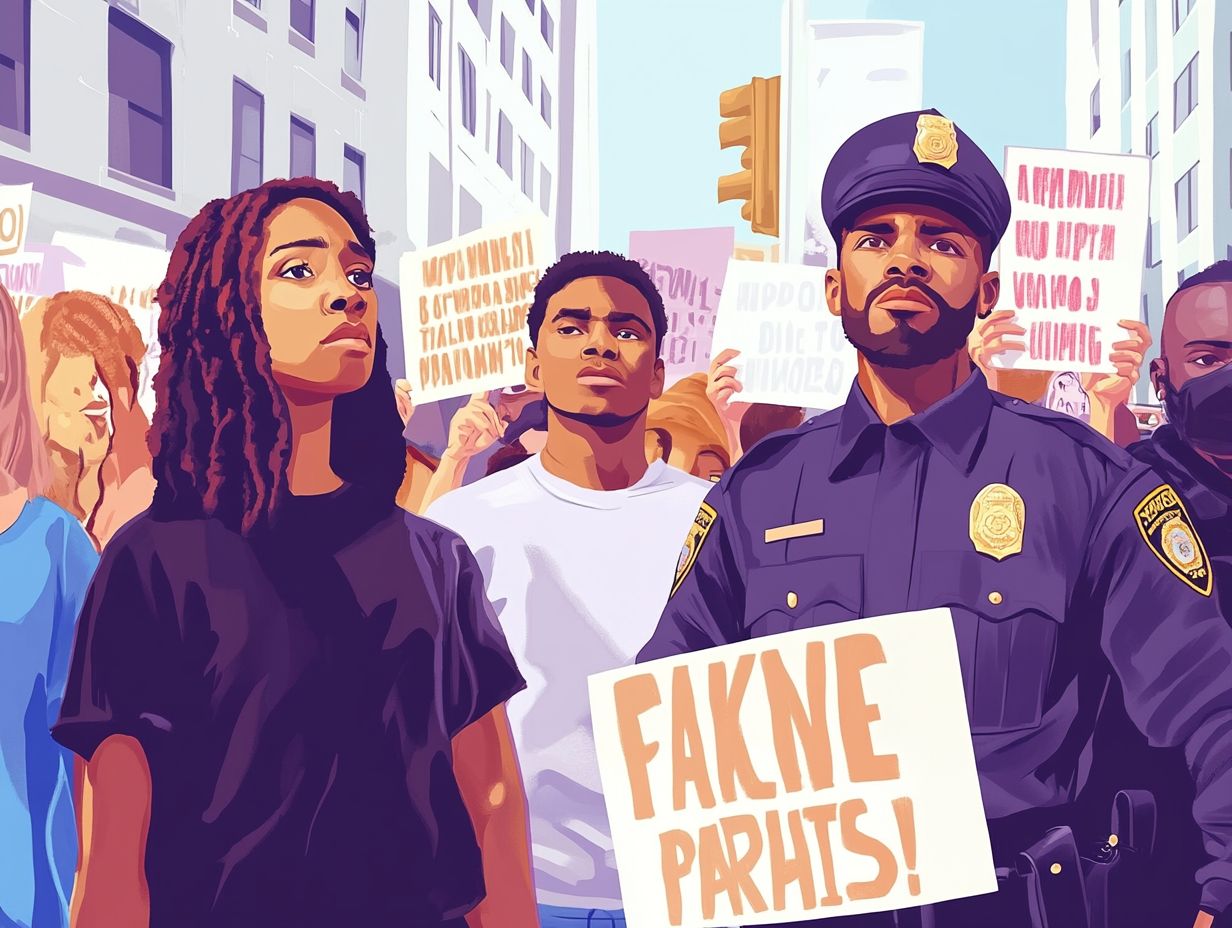
If you find yourself facing police misconduct, documenting the incident is crucial for building your case and safeguarding your civil rights. Begin by carefully writing down everything you recall about the encounter capture the date, time, location, and descriptions of the police officers involved.
Gather any evidence like photographs or medical records. Seek legal advice to fully understand your rights and the proper procedures for reporting misconduct.
Consider reaching out to any witnesses who may have observed the incident. Their testimonies can provide invaluable support for your claims. Systematically organizing your notes and evidence will significantly bolster your complaint when you approach the authorities.
When it comes time to report the misconduct, ensure you follow up in writing to formally document your claims and ensure they are addressed. Legal counsel can offer essential guidance throughout this process, helping you navigate potential outcomes and the best strategies for advocating for your civil rights.
Understanding how to advocate can empower you to improve accountability in law enforcement!
Legal Protections Against Police Misconduct
Legal protections against police misconduct are essential for safeguarding your civil rights within the justice system. You benefit from various civil rights laws, including the Fourth and Fourteenth Amendments, which shield you from unreasonable searches and seizures while ensuring your right to due process.
Many police departments have their own internal policies aimed at addressing misconduct. These policies offer clear guidelines for acceptable officer behavior, creating a framework that holds officers accountable.
Civil Rights Laws
Civil rights laws are essential in safeguarding you from police misconduct and ensuring that constitutional standards are upheld, particularly when it comes to unreasonable searches and arrests. The Fourth Amendment is especially crucial, as it affirms your right to be secure in your person, home, and belongings against unreasonable searches and seizures.
Grasping these laws gives you the power to challenge police misconduct effectively. This foundational freedom has been reinforced through landmark legal cases like Mapp v. Ohio, where the Supreme Court declared that evidence obtained in violation of the Fourth Amendment cannot be used in state courts.
The Fifth Amendment further protects you against self-incrimination, ensuring that you cannot be coerced into making incriminating statements something that is often overlooked during high-pressure interrogations.
The Fourteenth Amendment extends these protections by mandating due process under the law. Landmark cases such as Miranda v. Arizona have highlighted your essential rights as an accused individual, enhancing accountability in law enforcement practices.
By understanding these amendments and their implications, you can navigate your rights more effectively and stand firm against any potential abuses by the police.
Internal Police Policies
Internal police policies are essential for setting the standards for officer conduct and tackling issues of misconduct within law enforcement agencies. These policies delineate what is expected of police officers, including guidelines on the use of force, interactions with the public, and the procedures for reporting misconduct.
By clearly defining acceptable behaviors and outlining the steps for disciplinary action when violations occur, these frameworks serve a dual purpose: they prevent misconduct and ensure accountability. When officers understand that they are held to established standards, it cultivates a culture of responsibility that can permeate the entire department.
These policies aren t merely reactive; they actively safeguard civil rights by establishing clear boundaries on police actions and providing citizens with a straightforward path for recourse.
Regular training and communication regarding these internal policies not only highlight their importance but also empower officers to carry out their duties with integrity and respect, ultimately bolstering public confidence in law enforcement.
Frequently Asked Questions
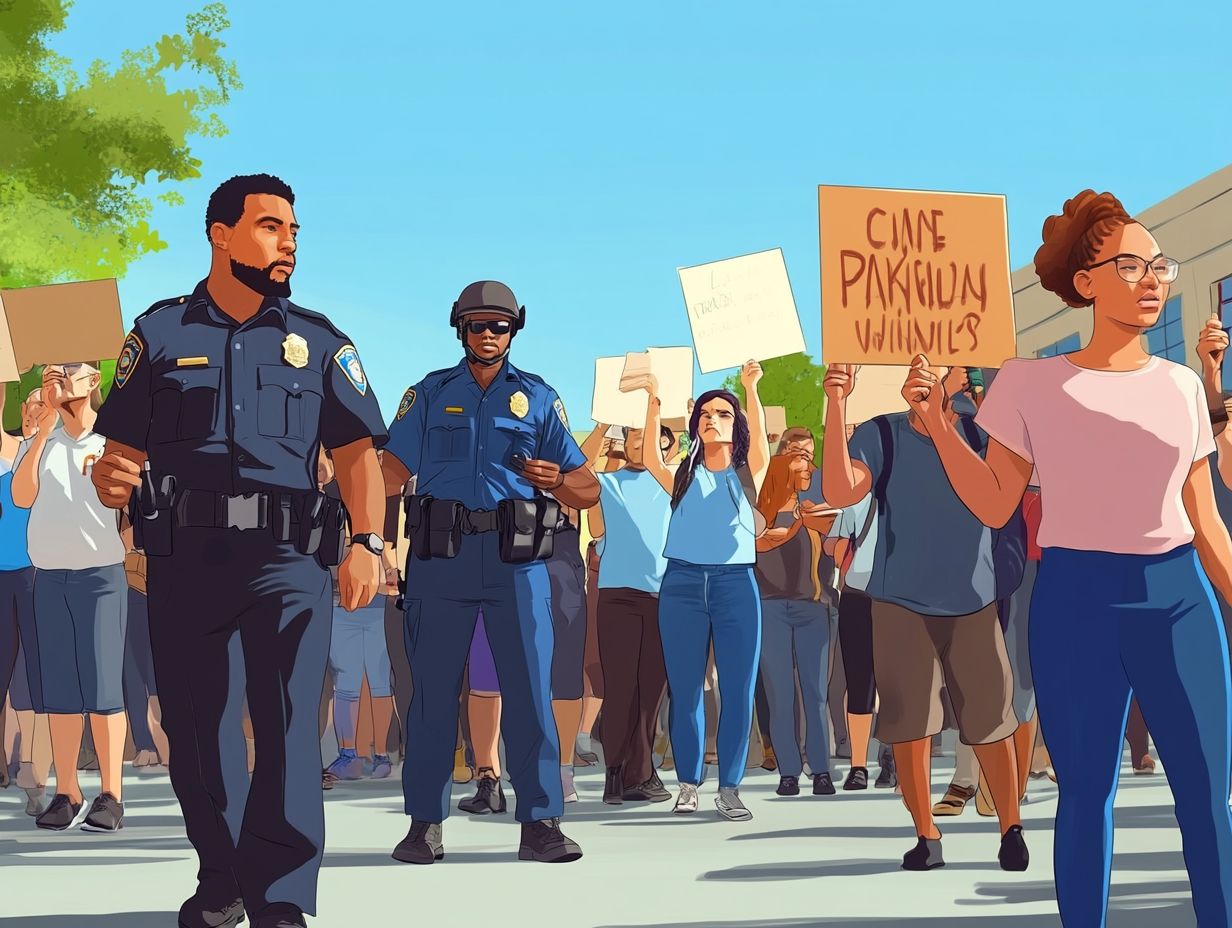
What is the purpose of understanding police conduct and your rights?
Understanding police conduct and your rights during arrest is essential for protecting yourself. It ensures you receive fair treatment when dealing with law enforcement.
What are some rights I have when interacting with the police?
You have the right to remain silent and to request an attorney. You also have the right to be free from unreasonable searches, which means police cannot search you or your belongings without a good reason.
What is considered appropriate police conduct?
Appropriate police conduct means following the law and departmental policies. Officers should treat everyone with respect and only use necessary force.
What should I do if I feel my rights have been violated by the police?
If you think your rights have been violated, stay calm and document everything. Act quickly to protect your rights by filing a complaint with the authorities and consider seeking legal help to understand your next steps.
Are there any exceptions to my rights when interacting with the police?
Your rights can be limited during lawful arrests or public emergencies. Even then, police must follow strict guidelines.
How can I educate myself on my rights and police conduct?
Many resources can help you understand your rights, such as websites, workshops, and legal clinics. Stay informed about changes in laws that might affect you.

